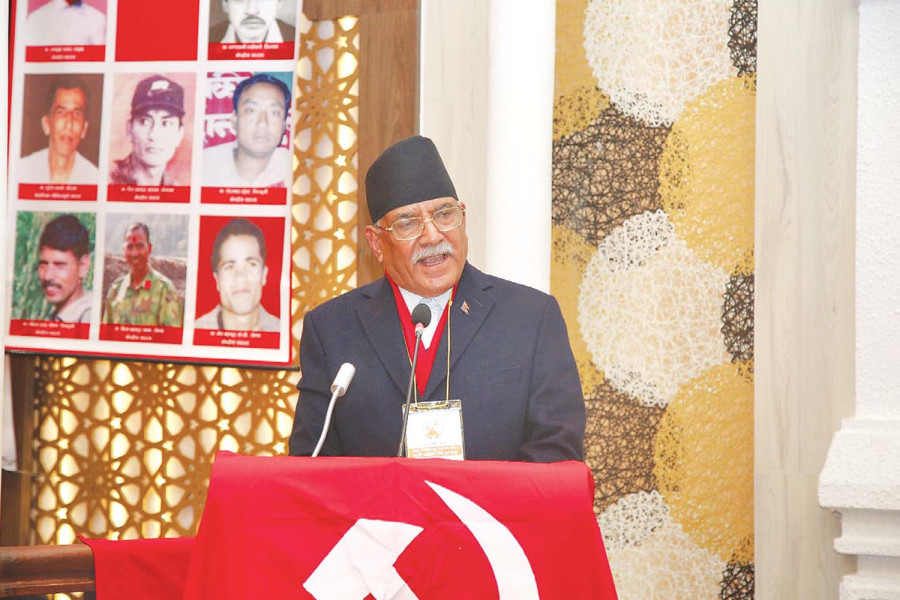Politics
Dahal orders Maoist leaders to disclose income sources
The former rebel leader says it was getting hard to differentiate between the ‘broker class’ and the Maoists.
Purushottam Poudel
CPN (Maoist Centre) chair Pushpa Kamal Dahal has asked party’s central and provincial level leaders to submit the details of their sources of incomes. He did so at the party’s central committee meeting that commenced on Sunday.
Stating that it was getting hard to differentiate between the ‘broker class’ and the Maoists, Dahal proposed that the central committee members and provincial office bearers submit details of their income as well as their income sources to the party’s head office by February 13 (the day the Maoists launched their 10-year armed insurgency in 1996).
Dahal also proposed that any individual from non-communist background should complete three months of orientation in the party’s school department before joining the party.
Dahal, in his political document titled ‘Party transformation and rebuilding: Needs of today,’ which was presented in the central committee meeting on Sunday, claims that the Maoist Centre is the country’s leading communist force.
Accusing the CPN-UML, the second largest party in Parliament and the country’s largest communist party, of deviating from communist values, Dahal said his party was still the major communist force in the country.
The 30-page political document, presented verbally at the meeting, states that while it was right to collaborate with the Nepali Congress and the UML to institutionalise the republic, it is now necessary for the party to forge ahead on its own.
Dahal in his paper described the Congress and UML as traditional parliamentary forces and claimed that collaborating with these forces would not strengthen the democratic republic.
“Due to the ideological deviation of the UML, the Maoist Centre is the main Communist force of the country,” Dor Prasad Upadhaya, a central committee member, quoted the party chair’s political document.
“Although the latest populist inclination is towards new political parties, including the Rastriya Swatantra Party [RSP], this won’t last as the party has no ideological clarity,” reads the document. “Only the Maoist Centre can thus be the alternative political force; we must move forward with clear ideas and a clear plan of action.”
While Dahal’s political document is critical of the UML and the RSP, it is soft on the Congress, the largest political party in the country.
On Monday, the second day of the meeting, party chair Dahal said that the issue of differences in opinion among the top leaders in the party had been addressed, and other issues would be resolved at the party’s general convention.
In his brief statement at the start of the meeting on the second day, Dahal stated that internal unity had been strengthened and concerns of deputy general secretaries Janardan Sharma and Haribol Gajurel addressed.
“By addressing the concerns of Janardan Sharma and Haribol Gajurel, we have established intra-party unity,” Upadhaya quoted Dahal as saying.
Some demands of Sharma and Gajurel include: selection of leaders in party’s organisations through election; dismantling of the current hierarchy; and a special general convention.
Similarly, Sharma and Gajurel have demanded fair work division within the party, claiming that while some leaders have a heavy workload, others have no role or responsibility.
Of the 130 central committee members who enlisted to speak at the party’s central committee meeting by Monday, at least 80 have expressed their views on Dahal’s document.
In the document, Dahal tries to incorporate all sectors and relevant issues. But a party secretary accuses the document of being ‘unintelligent’.
“When trying to address all pertinent issues, the political document is all over the place,” said Surendra Kumar (Ram) Karki, a secretary of the party.
Yet most central committee members who spoke until Monday have shown their support to the party chair.
“But even those who have shown their loyalty to the Maoist Centre leader have urged the leadership to change the party’s orientation,” added Karki.
Former Vice President Nanda Bahadur Pun, who had attended a few recent party meetings just as a member, this time shared the podium with the party chair and other top office bearers. After Pun’s return to party politics, some leaders who spoke at the central committee questioned the ground on which he was rejoining active politics.
Sudan Kirati, a politburo member and former minister, argued that a leader who has already held a top state position should not return to party politics. “Instead, we should place him higher than party members,” a central committee member quoted Kirati as saying at the meeting.
Kirati was not alone in questioning the former Vice President's return to active politics. So did Indra Angbo.
“Former Presidents and Vice-Presidents should be active in the social sector instead of rejoining the party politics,” Angbo told the Post after the central committee meeting.
According to Angbo, the issue of unity among communist parties was also discussed during the meeting.
Some central committee members also demanded that the issues raised by party deputy general secretary Sharma in the Standing Committee meeting held in the first week be addressed.
Back then, some party office bearers, including Sharma, had demanded that the party leadership make way for a new generation.
Sharma then submitted a written proposal calling for a review of Dahal’s leadership and suggesting that Dahal be given the role of a patron, a ceremonial post.
Likewise, Barshaman Pun, another deputy general secretary, had called for a clear deadline on the transfer of leadership.




 26.12°C Kathmandu
26.12°C Kathmandu















